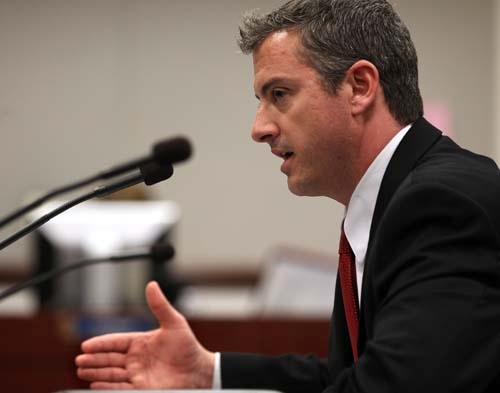Sandoval’s office admits shortfall in proposed budget

CARSON CITY — The governor’s office admitted Thursday that its proposed budget is $106 million out of balance but contended the shortfall will be covered from an unexpected growth in sales taxes and with help from President Barack Obama.
State Budget Director Andrew Clinger told the Senate Revenue Committee that the office overestimated the amount of money that could be moved from school districts’ bond reserves. He said the latest analysis shows that the state’s 17 school districts have $319 million in bond reserves that could be shifted to cover operating costs of their schools over the next two years. Gov. Brian Sandoval had proposed $425 million in his budget.
But Democrats in the Legislature didn’t like the governor’s solution Thursday. They demanded that he quickly announce how he intends to cover the $106 million hole.
Since the Legislature convened on Feb. 7, Democrats have contended that Sandoval’s budget is as much as $2 billion short of the real needs of the state, and tax increases might be needed.
Sandoval and Republicans have vowed to block any moves to increase taxes, but Democrats hope they can be persuaded to consider tax increases once they see the effects of cutting education, mental health and other state-funded programs.
When the state Economic Forum meets in May, Clinger told the committee, members will forecast much more in sales tax revenue than they estimated in December.
Clinger based that prediction on signs of the beginning of an economic recovery. Sales tax revenues have grown for six straight months in comparison with the same month a year earlier.
He said Nevada will pick up another $66 million because Obama wants to delay by two years the time when states must begin to pay interest on federal loans to cover unemployment benefits. Sandoval had put that expenditure in his budget. According to news reports, with the exception of Florida, governors of both parties support Obama’s plan.
“If we had the Economic Forum today, the budget would be balanced,” Clinger said. “We are looking for the economy to recover. Sales tax collections have been growing.”
That response bought a sharp rebuttal from Democrats.
“The state cannot wait until May,” said Senate Majority Leader Steven Horsford, D-Las Vegas. “You have a huge deficit.”
Horsford pointed out that Clinger is betting on Congress to approve Obama’s plan to delay interest payments, and that might not happen. He also said Congress probably will not act on the plan to delay interest payments until July or August, which would be long after the Legislature’s scheduled June 6 adjournment.
“You are betting on the president’s plan being approved,” Horsford said. “That is a leap in faith. Waiting for the federal government to bail us out is not a solution.”
Sen. Mike Schneider, D-Las Vegas, said rising gasoline prices might frustrate a recovery because Nevada relies on tourism and tourists might not come because of the high fuel prices.
Revenue Committee Chairwoman Sheila Leslie, D-Reno, said she was “not sure legally” that Sandoval can wait until May before submitting proposals to balance his budget. She requested Clinger come back with budget adjustments quickly.
Under the Nevada Constitution, the state must have a balanced budget and governors must submit balanced budgets to the Legislature.
Sandoval released his $5.8 billion budget proposal on Jan. 24.
The $106 million hole will be even bigger if legislators don’t approve other changes announced Thursday by Clinger. When Sandoval said he wanted school districts to use so-called excess bond reserves to pay for school operating costs, his plan was to allow school districts to retain enough funds to cover six months of bond debt service payments.
Under his new plan, schools would keep only enough reserves to pay one month’s worth of debt payments.
In response to questions, Clinger said schools would be required by law to increase property taxes if they lacked the money to make the debt payments.
The plan also calls for the Clark County School District to use $124 million in car registration fee revenue that it uses for other purposes to instead help cover school operating costs over the next two years.
Jeff Weiler, the school district’s chief financial officer, gave a thumbs-down to the administration’s new plan.
He questioned whether the district would have revenue to cover emergency repairs to some of its 357 schools if its bond reserves were used for another purpose.
Associate Superintendent Joyce Haldeman said Sandoval’s plan would thwart the wishes of voters who in 1998 passed a $3.5 billion school bond issue.
That bond measure specifically stated that funds would be used to construct and repair schools, she said, not to cover operating costs.
Contact Capital Bureau Chief Ed Vogel at evogel@reviewjournal.com or 775-687-3901.